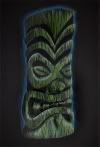Esquivel – King of Space-Age Pop
 Esquivel is my favorite composer of exotica, lounge and space age pop music. He took a zany approach to the sonic wallpaper of cocktail lounge music that flirted with parody, spiking it with quirky instrumental interjections and singers cooing nonsense syllables. Esquivel’s production style makes for great headphone listening. A pioneer of stereo recording, he sometimes directed two bands in separate studios by closed circuit.
Esquivel is my favorite composer of exotica, lounge and space age pop music. He took a zany approach to the sonic wallpaper of cocktail lounge music that flirted with parody, spiking it with quirky instrumental interjections and singers cooing nonsense syllables. Esquivel’s production style makes for great headphone listening. A pioneer of stereo recording, he sometimes directed two bands in separate studios by closed circuit.The Space Age Pop Music Page has a detailed bio with discography and sound clips, excerpted below:
Juan Garcia Esquivel was born in Mexico in 1918, After mastering the piano, he taught himself composition and arranging when he was fourteen and headed a 30-piece orchestra by age 17.
Esquivel honed his talents with a 24-piece orchestra at Mexico City’s popular radio station, XEW . In addition to writing jingles, he composed an original soundtrack every day for Panseco, a popular radio comedian. “The entire orchestra would arrive at ten o’clock in the morning,” he recalled recently, “the comedian would give me the script for the day, and the boy who set up the music stands would give each musician a pencil, an eraser, and blank music paper.” By the time the comedian’s show aired at 8:00 p.m., Esquivel had composed and arranged the score and rehearsed the orchestra.
When he first arrived in Hollywood in January 1958 to record “Other Worlds, Other Sounds” for RCA , the record company gave him just five hours of studio time to record the twelve tunes. Esquivel had rehearsed the orchestra so well that he finished in three and a half. He used the remaining hour and a half to rehease and record an entire second album’s worth of material with a smaller combo, released as “Four Corners of the World.”
Later albums became more elaborate—and more expensive to record. 1962’s “Latin-Esque” required stereo separation so total that the orchestra was split into two parts and placed in two entirely separate studios a block apart, linked by closed-circuit TV and headphones. Esquivel conducted both orchestras simulaneously, recording the album in the new 4-channel method. As with all his recordings, there was no overdubbing. Each tune was recorded live, though Esquivel was such a perfectionist that many takes were usually required.
Esquivel wrote, arranged, and performed incessantly, working for 32-hour stretches and then sleeping for eight. His live show, “The Sights and Sounds of Esquivel,” had a 12-year gig at the Stardust Hotel in Las Vegas, and toured other cities, and Esquivel also found time to compose and record for dozens of television series (including Markham, The Tall Man, The Bob Cummings Show, Kojak, Charlie’s Angels, Simon and Simon, and Magnum PI, among many others), and record several more lps for a total of eleven domestic releases. When his orchestra broke up in 1974, he returned to Mexico where he continued to record for film and television; an album tied to a children’s TV series sold more than a million copies in 1978.
Esquivel’s lasting influence can be felt especially on TV soundtracks. He not only provided music for many series, but his style can be readily discerned in many others of the same period. The percussion and brass arrangements in the theme to “I Dream of Genie,” for instance, fairly drips with Esquivel style.
See also:
Juan García Esquivel on Wikipedia
Esquivel’s Allmusic bio(Cross-posted from my MOG)
